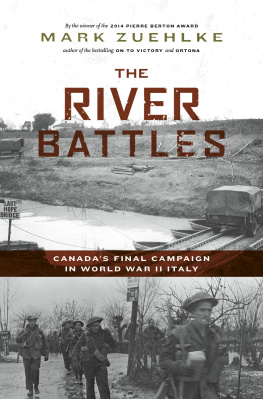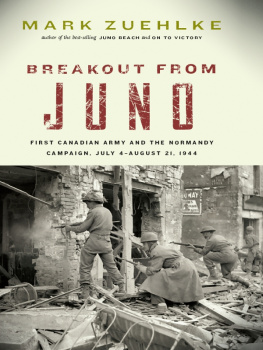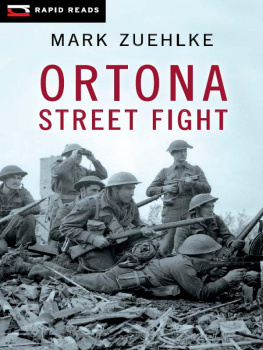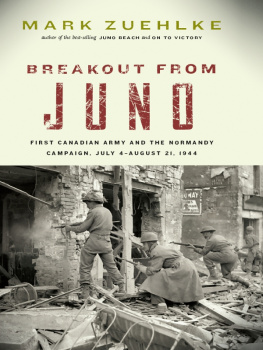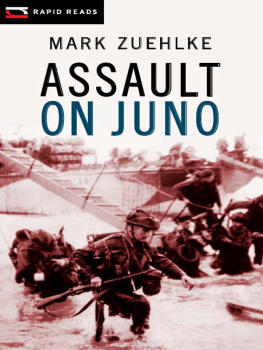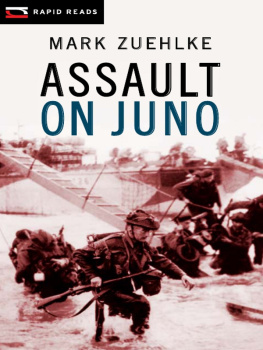THE
LIRI VALLEY
THE
LIRI VALLEY
CANADAS WORLD WAR II BREAKTHROUGH TO ROME
MARK ZUEHLKE

Copyright 2001 by Mark Zuehlke
First paperback edition 2003
First US edition published in 2004
03 04 05 06 07 5 4 3 2 1
This book was published originally by Stoddart Publishing.
All rights reserved. No part of this book may be reproduced, stored in a retrieval system or transmitted, in any form or by any means, without the prior written consent of the publisher or a licence from The Canadian Copyright Licensing Agency (Access Copyright). For a copyright licence, visit www.accesscopyright.ca or call toll free to 1-800-893-5777.
Douglas & McIntyre
2323 Quebec Street, Suite 201
Vancouver, British Columbia
Canada V5T 4S7
www.douglas-mcintyre.com
National Library of Canada Cataloguing in Publication Data
Zuehlke, Mark
The Liri Valley: Canadas World War II breakthrough to Rome / Mark Zuehlke.
Includes bibliographical references and index.
ISBN 1-55365-013-1
1. World War, 1939-1945CampaignsItalyLiri River Valley.
2. Canada. Canadian ArmyHistoryWorld War, 19391945. I. Title.
D763.I82L57 2003 940.54'21562 C2003-910549-0
Library of Congress Cataloging-in-Publication data is available.
Cover design by Peter Cocking
Cover photograph by Strathy Smith, NAC, PA-169121
Part title photograph by Daniel Crack
Interior design and typesetting by Kinetics Design & Illustration
Printed and bound in Canada by Friesens
Printed on acid-free paper
Distributed in the U.S. by Publishers Group West
The publisher gratefully acknowledges the financial support of the Canada Council for the Arts, the British Columbia Arts Council, and the Government of Canada through the Book Publishing Industry Development Program (BPIDP) for its publishing activities.
War, which used to be cruel and magnificent,
has now become cruel and squalid.
Winston Churchill
Of what use is decisive victory in battle
if we bleed to death as a result of it?
Liddell Hart
Hey, Willy. Youre going back
in a box if you dont watch out.
Sergeant Bill Worton, Seaforth Highlanders of Canada
PREFACE
Since publication of Ortona: Canadas Epic World War II Battle in 1999, I have been blessed with ever more contacts within the small community of the remaining Canadian veterans of the World War II Italian Campaign. As was true of that first work in what is now to be a trilogy on this long, brutal, and costly campaign, this book would not have been possible without their contribution. It is their ability and willingness to reach back across the span of almost a lifetime to recount often painful wartime experiences that enriches the pages here. In letters, personal interviews, e-mail correspondence, and telephone calls, they provided the vivid details that sifted together with the official records, regimental war diaries and official histories, autobiographies and biographies, and other archival materials enabled depiction of the combat experienced by Canadians in the Liri Valley in the spring of 1944.
There is a school of thought in the study of military history that advocates the belief that veteran memories, filtered as they are by the span of time, are suspect. Accordingly, the only fact that can be relied upon is that provided by the official records and histories particularly where veteran memory contradicts such sources. Yet anyone delving into the official histories will find that the record is quite often muddled and contradicted by the accounts filed by soldiers at the time and by the many day-to-day records contained in the regimental war diaries. The fog of war becomes particularly thick during the furtive, desperate days when a great battle is under way and often the paperwork that ultimately becomes the basis for the official record is not completed until days or weeks after the event. Often, too, officers stationed well back of the fighting lines wrote these records with only passing consultation with the men who had been in combat.
So where is truth? The official record or the memories of the veterans? Each writer plunging into the writing of military history ultimately develops a personal, somewhat unscientific, process for filtering information. Mine involved using a fair degree of gut instinct and cross-checking supposed facts wherever possible. When two or three veterans said the same thing and this contradicted the official record, it seemed to me logical that these old soldiers, who had been there when the bullets and shrapnel were flying around them, were most likely telling the story truthfully. It should be particularly noted that I have yet to find a veteran who showered himself in glory and heroism. Most are modest to a fault about their own role in events.
For those caught in its maw, war is a terrifying and intensely mind-focusing experience. Sensations are heightened as the adrenaline courses through the body and memories were so deeply seared into the mind of many veterans that they will never be forgotten. It has been a source of amazement to me to discuss the fighting in the Liri Valley with a veteran and have him provide a precise time reference down to the virtual minute at which something pivotal occurred. Go back to the official war diaries and the veterans time reference is seldom out and, if so, by no more than a minute or two.
I found that where a veteran was unsure of something, or simply could not remember, he invariably informed me of the fact. I dont remember the details of this event was a fairly common response to my oral or written questions. Often a battle had been so intense and prolonged that the events became a jumble or, as they often stated, a blur. Yet through this haze of time, many incidents were starkly illuminated in their descriptions. Pierre Potvins horrific, yet selfeffacingly humorous, account of his suffering multiple wounds on the edge of the Hitler Line. Tony Kingsmill standing next to his experimental bridge at the Gari River and watching a flow of terribly injured young Indian soldiers stream past on their way to the rear. Tankers, like David Kinloch, seeing friends and comrades perish inside the burning wreckage of Sherman tanks. Those are the types of memories reflected in this book.
Finally, it should be noted that the many stories regarding the experiences of individual veterans related here normally align closely with the official accounts. Where there is discrepancy, I have endeavoured to verify details with other veterans or other historical source material. Seldom have I found a veteran in error and normally this was limited to mixing up dates and precise locations. Usually I have been able to locate sufficient other accounts by veterans or source material to enable the creation of an accurate depiction of events. Where the official record and that of veterans conflicted dramatically, I have more often trusted the veteran accounts. They lived the battle, buried comrades in its aftermath, and carried the scars of the physical and emotional wounds suffered there for the rest of their lives.
ACKNOWLEDGEMENTS
The veterans who contributed to this book are listed in the bibliography and it is to all of them that I owe the greatest thanks. I would, however, like to single out a few for specific recognition. Without Tony Poulins meticulous translation of letters and accounts written by Pierre Potvin, that soldiers incredible ordeal before the Hitler Line would not be included here. Strome Galloway was always gracious and quick to respond to my queries on many topics. Victor Bulger, John Dougan, Stan Kanik, David Kinloch, Charles Prieur, and Frederick Ritchie were equally helpful and patient. Bill Worton served as a guide to other veterans in Vancouver. In a lengthy written account of his experiences, Donald Reid provided many details about the rear-area operations of a tank regiment that greatly broadened my understanding of armoured operations in Italy. Unfortunately, space limits did not allow inclusion of much of his material, but it is now deposited at the Museum of the Regiments in Calgary and will be a boon to other researchers.
Next page

